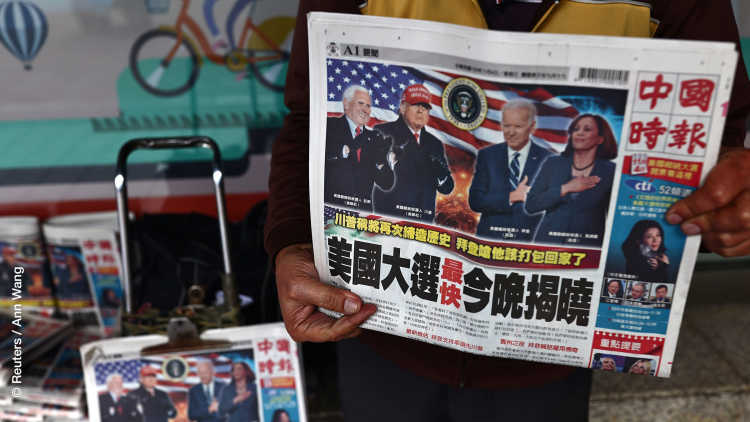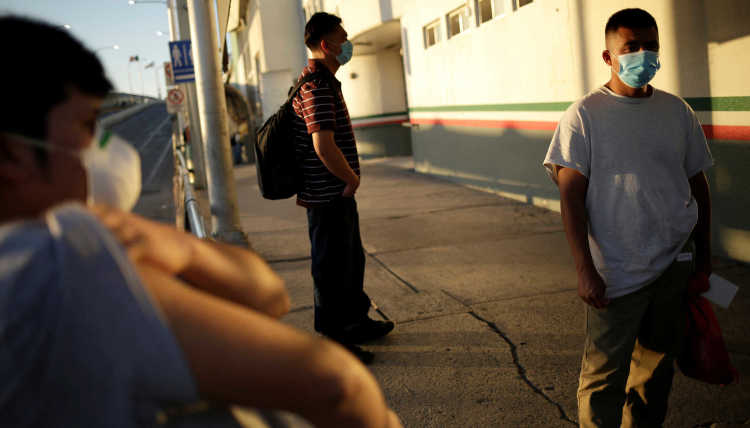- Home
- Publications
- GIGA Focus
- When Tone Is Not Everything: Joe Biden and Latin America
GIGA Focus Latin America
When Tone Is Not Everything: Joe Biden and Latin America
Number 1 | 2021 | ISSN: 1862-3573

Joe Biden’s election has raised many expectations. However, due to long-established legacies and predominant bipartisan consensus around the United States’ Western Hemisphere policy, changes will be in tone rather than in substance. Four topics will shape the agenda.
Post-COVID-19 reconstruction: With the pandemic raging across the region, a return to a “business as usual” approach will not meet the Latin American people’s urgent economic, political, and social needs. COVID-19 has further brought to light the region's structural problems, including but not limited to poverty, inequality, and insecurity.
Migration: Biden has promised to boost the resources sent to Central American countries by USD 4 billion in the hope of reducing immigration to the US. The president wants to carry out a so-far-abstract and light migration reform as well. However, there is no discernible strategy to deal with the rest of the hemisphere’s challenges (e.g. the Venezuelan crisis).
Democracy: Not every president is happy with the election’s result. From Mexico to Brazil, passing through Central America, some governments identified with Donald Trump’s confrontational rhetoric and profited from his disregard for their internal affairs. Among them, far-right leaders fear the end of the “free pass” granted to their heavy-handed and anti-democratic words and deeds.
Regional and global scenario: in the context of China’s increasing economic and diplomatic presence in the region, Biden’s appeal to restore US “hemispheric leadership” appears hollow.
Policy Implications
Trump’s actions and the political cleavages he helped deepen have turned the US into a less reliable partner. As a consequence, Latin America will have to find its own answers, and new strategic partners to implement them. The region is essentially alone in weathering the COVID-19 and the structural problems the crisis exacerbates. In this context, Latin America and the European Union will need to undertake more relevant, autonomous joint strategic initiatives or resign themselves to being bystanders in others’ commercial, technological, and geopolitical endeavours.
Trump’s Nefarious Legacies
Biden will have to face many challenges in his relationship to Latin America. One of the first ones is the damaging legacy the Trump administration left. Trump’s policy toward Latin America can be summarised in four words: migration, NAFTA (North American Free Trade Agreement), Venezuela, and Cuba. Alternatively, in three: disinterest, ignorance, and racism. Trump only ever visited Latin America once as president. Even then, it was only for the G20 summit. He also cancelled his participation in the Hemispheric Summit of the Americas with three days to go, being the first US president to do so. All this signalled his chronic lack of interest in the region. In contrast Obama travelled to Latin America 15 times (Dannemann 2018).
Starting with his first presidential campaign, Trump identified trade with Mexico and migration from Central America as the two most important issues on his bilateral regional agenda. There was no policy for his relations with Latin America, beyond imperialistic references by his administration to the Monroe Doctrine’s return. Hence, NAFTA’s renegotiation and Mexico’s instrumentalisation as a buffer for migration were the first items on his strong-arm North American agenda. Moreover, he forced the Central American countries to accept a third country – namely, Mexico – as their refuge. The Trump administration also suspended the protected status of Salvadorans and Hondurans in the US, stopped the Deferred Action for Childhood Arrivals (DACA), and attempted to phase the latter out. Furthermore, the images of children in cages forcefully separated from their families shocked the world. To the detriment of relations with the region, Trump paradoxically cut aid to Central American countries – accusing them of not doing enough to prevent migration to the US.
As globally, the Trump administration negatively impacted inter-American and South American multilateralism. The epitome of this was breaking with the norm that the Inter-American Development Bank (IDB) always had a Latin American president. It was breached with Mauricio Claver-Carone’s election in 2020 for a six-year term, despite the protest of various Latin American countries, Claver-Carone’s lack of experience, and his overly McCarthyist positions.
On the other hand, after two unfounded accusations of facilitating Cuban doctors’ arrival and wanting to “strengthen” the island nation, Brazil and the US withdrew funding from the Pan American Health Organization (PAHO). Thus they left it defenceless and underfunded when it came to providing support to Latin American countries during the COVID-19 pandemic.
Furthermore, in keeping with his global discourse, Trump pointed to China’s growing economic presence in the region as a threat to US security. That is why he launched the “Growth in the Americas” initiative to facilitate and incentivise the US private sector’s investment in Latin American energy and infrastructure projects. Some saw it as a counterweight to global Chinese infrastructure projects (such as the Belt and Road Initiative) and the latter’s massive loans to and investment in the region. Nonetheless, the US initiative’s impact has been non-existent so far.
During his recent re-election campaign, Trump’s priority was attack on Venezuela and Cuba via a Cold War-style speech. With it, he tried to secure the Latino vote in Florida. He accused Biden of being a Castro-Chavista socialist. Regarding his Venezuelan policy, he played his most critical cards quickly and without visible results: the recognition of Juan Guaidó as president of Venezuela as well as the oil embargo. These moves did not bring any substantial change other than the worsening of the Venezuelan population’s already-impoverished condition. Concerning Cuba, the Trump administration reversed the measures advanced by Obama to restore relations with the island nation. He imposed more sanctions on remittances and restrictions on the travel of US citizens to the country. Moreover, with a few days left in office, he arbitrarily returned Cuba to the list of countries sponsoring terrorism. To be sure, even with claims to be set to reverse some of these measures and advance à la Obama, we should not expect Biden to go further than that.
Beyond his words and deeds, Trump’s defeat might affect a blow to far-right Latin American leaders who have lost their most important ideological ally.
The Inertia of United States Latin American Policy
There is no doubt that Joe Biden’s administration means a change of tone in the United States–Latin America and the Caribbean relationship. He has pledged to correct Donald Trump’s neglect and incompetence in the region. However, tones and shades of meaning will not suffice if his purpose is to rise to the challenge of becoming a real partner for Latin American countries. We should remember that Biden himself has also expressed racist positions in the past and already after being sworn in, even if he has not tried to capitalize this politically as Trump did. For instance, when asked about African-American and Latino citizens low vaccination rate, he claimed that it was because they did not know how to get online to schedule their appointments. Years ago, he also was amid a polemic for claiming that then-senator Obama was the “…first mainstream African-American who is articulate and bright and clean and a nice-looking guy” (CNN 2007). Political commentators almost unanimously claim that he will pay more attention to the region. They argue that he represents the US president with the greatest knowledge of and experience in the area since the end of the Cold War.
Nevertheless, experience does not necessarily mean interest – especially when it comes to overcoming structural tendencies and bipartisan agreements to bring about significant change. Although the US continues to be the leading great power in the region, it has been retreating from Latin America since long before Trump appeared on The Apprentice (Vera, Defelipe, and Castro 2017). Beyond rhetoric, it is clear that the region has fallen down the US’s external agenda. Nevertheless, the US continues to be the region’s main trade partner. In 2019, it was also the second-largest source of foreign direct investment (FDI) after the European Union (CEPAL 2020a: 41–42).
In that context, after many clashes with George W. Bush, the election of Obama brought high expectations for a different and more engaged hemispheric policy. In that regard there were milestones, such as the US–Cuba rapprochement in 2015, meeting a virtually unanimous demand from the region – raised along with the non-delivered embargo’s lifting. However in many other aspects, such as a renewed migration and drug-policy approach, it fell short. For instance, then vice president Biden attempted to dissuade Colombia, Guatemala, and Mexico from proposing a change in the global drug policy that would clash with the US’s prohibitionism at the United Nations General Assembly Special Session on the World Drug Problem of 2016. Nevertheless, his recent remark that no one should go to prison for using drugs could at least create a more permissive environment for the Latin American countries that want to address drug policy as a public health issue and not as criminal policy one.
In short, there are reasons to be quite cautious about overwhelming change in US Latin American policy – that is, not to oversell the impact of a shift in tone. Conversely, the more leftist actors both inside and outside the Democratic Party that supported Biden’s election might pressure his administration for more substantial policy changes. That is where we should look for potential innovations.
Biden’s Road Ahead: A Divided Country, a Polarised Hemisphere
Biden has a rutted road ahead both at home and abroad. The wounds to the US’s international image and alliances are here to stay, as is the radicalisation of the far-right groups that supported Trump. These two fronts might make it difficult for the Biden administration to develop a comprehensive “Latin America strategy.” More than a one-size-fits-all approach, the region’s heterogeneity and ideological polarisation already call for a differentiated policy. Notwithstanding this, three specific challenges stand out on Biden’s agenda: the climate crisis; the situation in and around Venezuela; and, support for democracy and human rights.
The Climate Crisis
The new US president’s pledge to champion the fight against climate change has been received with support from some Latin American presidents and social movements, and with derisory looks from others. For example, during his campaign, Biden criticised Bolsonaro’s response to the Amazon fires and promised to rally the world to protect them. In turn, the Brazilian president was one of the last world leaders to recognise Biden’s victory and kept his support for Trump before, during, and after the campaign quite public – even for the voting-fraud accusations.
Nevertheless, there was a somewhat softer tone on environmental issues in a recent message sent to the US by the Brazilian Ministry of Foreign Affairs. However the note’s overall point was for Biden to stay away from Brazilian politics, and to find common ground in mutual interests instead. Parts of US civil society have already demanded the White House not sign any trade agreements with Brazil. This is due to previous talks on the matter that were held with the Trump administration.
In general, the new US administration should not lose sight of the fact that a significant part of the region’s economy continues to depend heavily on fossil fuels’ use and export. Thus concrete alternatives are required, including financial and workforce-retraining support as well as technology transfer.
Venezuela’s Quagmire
The Venezuelan situation continues to deteriorate, and there are no easy answers to its predicament. Most of the viable options for the international community appear largely ineffective. The Biden administration has already declared that it will not be negotiating with Maduro anytime soon and will continue to recognise Guaidó as the legitimate president of Venezuela. Hence there is no fundamental strategic change in sight, outside of refraining from making irresponsible “all cards on the table” claims. Despite this, some unconfirmed sources claim that Biden is putting together a team to negotiate free and fair elections in exchange for lifting sanctions (Jairissati 2021). Still, so far, there have only been official comments on the more “strategic” or “intelligent” use of sanctions. Besides, Biden has promised to provide more financial support to Colombia as the country taking in the most Venezuelan immigrants. In that regard, his administration could encourage other Latin American countries to follow Colombia’s lead, welcoming and providing legal and humanitarian support to more Venezuelans.
Democracy and Human Rights
Latin American governments and civil society expect Biden to criticise authoritarian and human-rights-violation trends in the region. This will need to contrast with Trump’s one-sided approach, only criticising what he considered the “troika of tyranny” (Cuba, Nicaragua, and Venezuela). In contrast, he kept silent about Bolsonaro, Alejandro Giammattei, Nayib Bukele, and other right-wing leaders’ abuses. Consequent policy also implies questioning the legitimacy of the secretary general of the Organization of American States, Luis Almagro, for advancing this one-sided tendency and his role in the delegitimisation of the Bolivian elections with insufficient and ultimately false evidence. Also, for Almagro’s unsubstantiated allegations that Maduro was behind the wave of legitimate social protests in the region in 2019.
One of the challenges here as in many other regards is the lack of confluence among Latin American positions. Many of the region’s countries are internally and externally polarised around ideological axes, making the coordination of a joint stance around the defence of democracy rather unlikely. This division has already caused the disintegration of the Union of South American Nations, and the Community of Latin American and Caribbean States’ paralysis. Moreover, an extremely worrying development is that the current pandemic is putting democratic institutions under even greater pressure.
An excellent place to start would be to pressure the Colombian government to step up the implementation of the peace process, including protecting the lives of the social leaders and ex-combatants who are being systematically assassinated with no decisive action taken by the Duque government to prevent it -as well as other points of the peace agreement. Fortunately, it seems like the Biden administration has started to act in this regard by asking the Colombian government for clarification on the matter. However, it remains to be seen whether the new US president will be willing to pressure for concrete results beyond Duque’s predictable deflection attempts.
Nevertheless, Latin American governments might be less inclined to accept democracy lessons from the US after the Capitol insurrection and Trump’s acquittal in his second impeachment trial. Besides, for decades, the perception of a significant part of the region has been that Washington intervenes more according to its strategic and geopolitical interests than to advance democratic rule (Kurtenbach 2019). Biden might face a similar problem when addressing the corruption problem in the region after Trump’s scandals. Due to the impunity shown in the Odebrecht case and others, this should not only be focused on the Northern Triangle as his plans suggest. In the anti-corruption fight it will be critical to strengthen and protect the autonomy of internal judiciaries. It would be a great signal for him to deliver on his promise to create a regional institution to fight corruption and rally and help coordinate the multilateral work of state, non-state actors and international institutions including United Nations investigative commissions such as the one whose mandate was not renewed in Guatemala by former President Jimmy Morales.
Quickly Changing National and Regional Paths
COVID-19 has once again brought to the fore the structural weaknesses of the Latin American economies (CEPAL 2020b: 15). Economic growth is estimated to fall 9.1 per cent, poverty levels have reached 37.3 per cent. Unemployment will amount to around 13.5 per cent, inequality has and will be further deepened, and external debt will increase by 9.3 per cent. Fifteen years of social progress and one decade of economic advancement risk receding entirely if decisive action is not taken immediately (CEPAL 2020b: 15). Furthermore, the pandemic has shown the precarious state of the social security and healthcare systems across the region, and the job market’s high informality (affecting around 54 per cent of the workforce) (Blofield, Giambruno, and Filgueira 2020). Due to the problematic situation in host economies, remittances have also fallen. This drop is generally damaging for the region, particularly for the economies that depend on remittances the most (in Haiti, 33 per cent of gross domestic product) (CEPAL 2020b: 18). Still, these numbers do not even account for the direct negative consequences of COVID-19 in 2021.
There is also the question of how Latin American countries can counter the worsened recession and reprimarisation in their economies. These are caused partly by the free trade agreements (FTAs) signed with industrialised nations and increased trade with China. In 2013, the percentage of primary products in Latin America exports to China (73 per cent) was higher than it was to the rest of the world (41 per cent) (Santana 2018). To counter these recession and reprimarisation trends, strengthened investment in research and development will be needed – as well as creating regional value chains (RVCs) to export more than just commodities to the global market.
These RVCs can also bring forward the fight against the climate crisis. For example, Ecuador exports the balsa wood used for wind turbines, Brazil manufactures the latter, and Chile is planning to invest heavily in wind energy (Osborn 2021). By combining these inputs much can be achieved in clean-energy procurement, as well vis-à-vis increasing intraregional value-added trade. These moves can improve job quality, decrease coal and oil dependence, and reduce the gigantic role commodities play in Latin American exports.
In this challenging context, more Latin Americans may attempt to migrate to the US. Thus, it is actually in Biden’s interest to radically upgrade help to the region beyond the USD 4 billion promised to Central America. Light migration reform and the more humane treatment of immigrants will help, but again fall short with regards to the region’s structural needs. Migrants – and the region as a whole – will need much more than the temporary suspension of heavy-handed detention. To be sure, how far the Biden administration can advance on these agendas will be facilitated by the Democrats’ advantageous position in Congress.
Moreover, in international policy, Biden has not presented himself as an agent of profound change, beyond reversing Trump most problematic policies. It remains to be seen how much further he is willing to go than what he proudly refers to as his “brand” (Washington 2020). So far, it seems that his brand will not provide the answers that Latin America and the Caribbean need. Thus it will also be up to regional leaders to pressure the US for more support and solidarity, while diversifying in terms of willing partners and potential financers. However some researchers fear that there might not be any leading Latin American voices to shape the US agenda, which might leave the space open for Miami hardliners to fill the void (Long 2021). Beyond the US, any help and reinforced partnerships that the region receives and rallies – especially during this trying period – will be long remembered, and mark its insertion in an increasingly disordered multipolar world.
Beyond colourful sea movements, the current political transitions in Latin America need to be examined in their comings and goings. Here certain examples might be in order: Some left-leaning governments are indeed returning to office. However, the heavy-handed policies of right-wing leaders are also enjoying significant popularity. Conservative governments like Colombia’s are implementing more progressive migration policies for Venezuelans, while also-conservative-led Chile deports them without regard for their ordeals. Further, the first round of Ecuadorian elections pitted, among other options, a pro-redistribution but still extractivist left against a more ecological one. In that framework of ideas, trend analyses and policies need to acknowledge these nuances.
Accordingly, extra-regional actors need to understand this complexity if they are to support the advancement of the welfare state that social movements and some political actors are trying to manifest. In that regard, they can also contribute to actively countering the McCarthyism of those who see legitimate social protests as dangerous polarisation or altogether communist uprisings inspired by the Venezuelan government. To be sure, this will help to undermine the Latin American neo-patriotic, anti-globalist, far right which seeks to antagonise progressive reform in this way (Sanahuja and López Burian 2020).
Pandemic Relief, COVID-19 Diplomacy, and the Multilateral Question
The biggest conundrum is whether the new US president and his government will help the region during and after the current pandemic, and if so how. In the worst nationalistic fashion, Trump hoarded respirators and other medical supplies during the virus’s first waves. Sadly, the same has happened with vaccines. The wealthiest countries have first ensured their supply and refused to open the patents for the poorest ones to produce them. They have also not redistributed or granted equal access to existing ones. In light of that, a few – now more and more, in fact – low- and middle-income countries are cutting deals to obtain the more affordable Sputnik V. China has approved a new vaccine to supply to the “developing” world too. The Chinese also provided Latin American countries with respirators and other medical supplies last year. As a result, they have strengthened diplomacy and perceptions of solidarity across the region – even despite the geopolitical resistance that the Asian country generates among governments and elites historically close to Washington.
In this context what could Biden specifically do? For starters, he could:
Support freeing the vaccine patent, and back its regional production.
Provide the PAHO and the World Health Organization’s (WHO) regional office with substantial funds and support. However, donations here will not be enough, the vaccine has to become a global public good.
Facilitate use of the International Monetary Fund’s special drawing rights to provide access to more cash for Latin American countries. However, this will only be effective for poverty relief if those funds do not go to the financial system but are directed instead towards social-protection programmes or purchasing vaccines.
Radically increase foreign aid to and investment in the region in critical areas such as infrastructure, clean-energy transition, and agricultural development. Unfortunately, no steps have been taken so far in this direction. In this context, Latin America and the Caribbean countries can work more determinedly among themselves and with other countries from the Global South due to their shared interests in overcoming the pandemic and advancing their development interests.
Furthermore, Latin America can become a more important partner for the EU in the international arena because of shared values and the former’s championing of multilateralism. Although polarisation around democratic rules and within hemispheric multilateral institutions does not make the region an irrevocably reliable partner (Kurtenbach 2019), its civil society and parts of its political class do steadily strive to strengthen domestic and international institutions. Moreover, it will be up to the EU to step up joint actions, such as the Alliance for Multilateralism, and to take a more substantial interest in the region. For instance, during the pandemic juncture, the EU could reflect this commitment by fast-tracking the sustainable loans needed in Latin America from international financial institutions. Another opportunity is advancing the democratisation of global governance via voting rights and backing Latin Americans for management positions within multilateral institutions (Benner 2019). A widened and deepened partnership can help Latin America and the EU not become global bystanders in the US–China trade war, in institutional and normative global reforms, and in other geopolitical and economic playing fields.
Footnotes
References
Benner, Thorsten (2019), Multilateralismus: Sechs Thesen auf dem Prüfstand, in: Internationale Politik, 6, November/December, 92–97.
Blofield, Merike, Cecilie Giambruno, and Fernando Filgueira (2020), Policy Expansion in Compressed Time: Assessing the Speed, Breadth and Sufficiency of Post-COVID-19 Social Protection Measures in 10 Latin American Countries, in: Social Policy Series, 235, Santiago de Chile: Economic Commission for Latin America and the Caribbean.
CEPAL (2020a), La Inversión Extranjera Directa en América Latina y el Caribe, Santiago de Chile: Naciones Unidas.
CEPAL (2020b), Estudio Económico de América Latina y el Caribe 2020: principales condicionantes de las políticas fiscal y monetaria en la era pospandemia de COVID-19, Santiago de Chile: Naciones Unidas.
CNN (2007), Biden’s Description of Obama Draws Scrutiny, 9 February, https://edition.cnn.com/2007/POLITICS/01/31/biden.obama/ (2 March 2021).
Dannemann, Victoria (2020), Elecciones en Estados Unidos: ¿Qué le espera a América Latina con Trump o Biden?, www.dw.com/es/elecciones-en-estados-unidos-qué-le-espera-a-américa-latina-con-trump-o-biden/a-55422965 (12 February 2021).
Jairissati, Jorge (2021), Will Biden Show Flexibility towards Venezuela?, www.aa.com.tr/en/americas/will-biden-show-flexibility-towards-venezuela/2125965 (10 February 2021).
Kurtenbach, Sabine (2019), Latin America – Multilateralism without Multilateral Values, GIGA Focus Latin America, 7, December, www.giga-hamburg.de/en/publications/12611005-latin-america-multilateralism-without-multilateralvalues/ (2 March 2021).
Long, Tom (2021), Biden’s Latin America Policy will be Constrained more by Weak Regional Leadership than by Florida’s Electoral Politics, https://blogs.lse.ac.uk/ latamcaribbean/2021/01/19/bidens-latin-america-policy-will-be-constrainedmore- by-weak-regional-leadership-than-by-floridas-electoral-politics/ (12 February 2021).
Osborn, Catherine (2021), Ecuador’s Green New Left, https://foreignpolicy.com/2021/02/12/ecuador-elections-green-new-left/ (10 February 2021).
Sanahuja, José Antonio, and Camilo López Burian (2020), The New Latin American Neo-Patriotic Far-Right: Reactionary Internationalism and Its Challenge to the International Liberal Order, in: Conjuntura Austral, 11, 55, 22–34.
Santana Suárez, Néstor (2018), ¿Reprimarización en América Latina?: Efectos de la demanda china sobre el patrón exportador latinoamericano y las estructuras económicas internas (1995–2016), in: Papeles de Europa, 31, 2, 149–173.
Vera, Diego, Camilo Defelipe, and Rafael Castro (2017), La estrategia de Estados Unidos hacia América Latina y el Caribe:¿un instrumento de la contención a China?, in: Eduardo Pastrana and Hubert Gehring (eds), La proyección de China en América Latina y el Caribe, Bogota: Editorial Javeriana, 471–501.
Washington, John (2020), We Need to Reverse the Damage Trump Has Done in Latin America. Biden’s Plans Don’t Cut It, https://theintercept.com/2020/04/18/trump-latin-america-foreign-policy-joe-biden/ (15 November 2020).
General Editor GIGA Focus
Editor GIGA Focus Latin America
Editorial Department GIGA Focus Latin America
Regional Institutes
Research Programmes
How to cite this article
Castro Alegría, Rafael (2021), When Tone Is Not Everything: Joe Biden and Latin America, GIGA Focus Latin America, 1, Hamburg: German Institute for Global and Area Studies (GIGA), https://nbn-resolving.org/urn:nbn:de:0168-ssoar-71940-5
Imprint
The GIGA Focus is an Open Access publication and can be read on the Internet and downloaded free of charge at www.giga-hamburg.de/en/publications/giga-focus. According to the conditions of the Creative-Commons license Attribution-No Derivative Works 3.0, this publication may be freely duplicated, circulated, and made accessible to the public. The particular conditions include the correct indication of the initial publication as GIGA Focus and no changes in or abbreviation of texts.
The German Institute for Global and Area Studies (GIGA) – Leibniz-Institut für Globale und Regionale Studien in Hamburg publishes the Focus series on Africa, Asia, Latin America, the Middle East and global issues. The GIGA Focus is edited and published by the GIGA. The views and opinions expressed are solely those of the authors and do not necessarily reflect those of the institute. Authors alone are responsible for the content of their articles. GIGA and the authors cannot be held liable for any errors and omissions, or for any consequences arising from the use of the information provided.

























